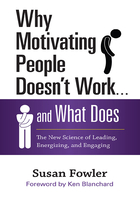
Potential answer 3: You don't know what to do with the evidence
You may be familiar with scientific evidence proving how traditional methods of motivation undermine employees quality of work and productivity. It may have captured your imagination and piqued your curiosity. But as often happens in attempts to simplify science, the ideas get boiled down to clichés that make them difficult to use. For example, the virtues of intrinsic motivation resonate with most of us at a deep level. They also cause fear and trepidation as the leader within you wonders, What are alternatives to abandoning the stick and weaning people off the carrot? How do I get and keep people intrinsically motivated? As well-intentioned as these questions are, they still reflect a traditional approach to motivation that suggests motivation is something you do to people.
It may have captured your imagination and piqued your curiosity. But as often happens in attempts to simplify science, the ideas get boiled down to clichés that make them difficult to use. For example, the virtues of intrinsic motivation resonate with most of us at a deep level. They also cause fear and trepidation as the leader within you wonders, What are alternatives to abandoning the stick and weaning people off the carrot? How do I get and keep people intrinsically motivated? As well-intentioned as these questions are, they still reflect a traditional approach to motivation that suggests motivation is something you do to people.
Popular books and speakers are doing the important job of raising awareness about the positive attributes of intrinsic motivation and the detrimental effects of extrinsic motivation. But the simplistic duality of good-bad, internal-external, either-or does not provide enough depth to use the ideas in a meaningful way.
Misunderstanding what motivation means leads to a misapplication of techniques to make it happen.
Admitting that many traditional approaches to motivation practiced all these years have been counterproductive—or worse, destructive—frees us up for new ways of looking at motivation. We need to realize that applying pressure to achieve results has undermined the results we were seeking. We need to consider that promoting competition or winning a contest is not the best way to encourage and sustain performance. We need to appreciate that—despite the practical need for money and people's incessant requests for more—the focus on monetary rewards has obscured what really satisfies people in their jobs. It appears motivating people doesn't work to generate the type of results we need. Leaders need alternatives that do. It is time to stop beating our people with carrots and sticks and embrace different, more effective, leadership strategies.
When it comes to motivation, we have underestimated ourselves—and perhaps even cheated ourselves—of something richer and much more meaningful than pellets, carrots, and sticks. By falling prey to the outdated Pecking Pigeon Paradigm, we convinced ourselves that this was the nature of motivation, and we bypassed the more human reasons we work.
The new science of motivation is full of promise. There are alternatives to the outdated Pecking Pigeon Paradigm and the constant grind to provide more and better pellets to get people to do what you want them to do. It shouldn't surprise you that people don't find those pigeons pellets satisfying.